Efficacy, safety and mechanism of Simiaoyongan decoction in the treatment of carotid atherosclerotic plaque: a randomized, double-blind, placebo-controlled clinical trial protocol
IF 3.4
2区 医学
Q1 Medicine
引用次数: 0
Abstract
Chronic inflammation is the major pathological feature of Atherosclerosis(As). Inflammation may accelerate plaque to develop, which is a key factor resulting in the thinning of the fibrous cap and the vulnerable rupture of plaque. Presently, clinical treatments are still lacking. It is necessary to find a safe and effective treatment for As inflammation. Simiaoyongan Decoction (SMYA) has potential anti-inflammatory and plaque protection effects. This protocol aims to evaluate the efficacy, safety, and mechanism of SMYA for patients with carotid atherosclerotic plaque. The assessment of SMYA clinical trial is designed as a randomized, double-blind, placebo-controlled study. The sample size is 86 cases in total, with 43 participants in the intervention group and the control group respectively. The intervention group takes SMYA, while the control group takes SMYA placebo. The medication lasts for 14 days every 10 weeks, with a total of 50 weeks. We will use carotid artery high resolution magnetic resonance imaging (HR-MRI) to measure plaque. The plaque minimum fiber cap thickness (PMFCT) is adopted as the primary outcome. The secondary outcomes include plaque fiber cap volume, volume percentage of fiber cap, lipid-rich necrotic core (LRNC) volume, volume percentage of LRNC, internal bleeding volume of plaque, internal bleeding volume percentage of plaque, plaque calcification volume, volume percentage of plaque calcification, lumen stenosis rate, average and a maximum of vessel wall thickness, vessel wall volume, total vessel wall load, carotid atherosclerosis score, hs-CRP, IL-1β and IL-6, the level of lipid profiles and blood glucose, blood pressure, and body weight. We anticipate that patients with As plaque will be improved from SMYA by inhibiting inflammation to enhance plaque stability. This study analyzes plaque by using HR-MRI to evaluate the clinical efficacy and safety of SMYA. Moreover, we conduct transcriptome analysis, proteomic analysis, and metagenomic analysis of blood and stool of participants to study the mechanism of SMYA against As plaque. This is the first prospective TCM trial to observe and treat As plaque by inhibiting inflammatory reaction directly. If successful, the finding will be valuable in the treatment of As plaque and drug development, especially in the “statin era”. This trial is registered on Chinese Clinical Trials.gov with number ChiCTR2000039062 on October 15, 2020 ( http://www.chictr.org.cn ).四妙汤治疗颈动脉粥样硬化斑块的疗效、安全性和机制:随机、双盲、安慰剂对照临床试验方案
慢性炎症是动脉粥样硬化(As)的主要病理特征。炎症可加速斑块形成,是导致纤维帽变薄和斑块易破裂的关键因素。目前,临床治疗方法仍然缺乏。因此,有必要找到一种安全有效的方法来治疗肛门炎症。辛夷坞煎剂(SMYA)具有潜在的抗炎和保护斑块的作用。本方案旨在评估SMYA对颈动脉粥样硬化斑块患者的疗效、安全性和机制。SMYA临床试验的评估设计为随机、双盲、安慰剂对照研究。样本量共86例,干预组和对照组各43例。干预组服用 SMYA,对照组服用 SMYA 安慰剂。疗程为每 10 周一次,每次 14 天,共 50 周。我们将使用颈动脉高分辨率磁共振成像(HR-MRI)来测量斑块。斑块最小纤维帽厚度(PMFCT)作为主要结果。次要结果包括斑块纤维帽体积、纤维帽体积百分比、富脂坏死核心(LRNC)体积、LRNC体积百分比、斑块内出血体积、斑块内出血体积百分比、斑块钙化体积、斑块钙化体积百分比、LRNC体积百分比、斑块钙化体积百分比、管腔狭窄率、血管壁厚度的平均值和最大值、血管壁体积、血管壁总负荷、颈动脉粥样硬化评分、hs-CRP、IL-1β 和 IL-6、血脂水平、血糖、血压和体重。我们预计,SMYA 将通过抑制炎症来增强斑块的稳定性,从而改善 As 斑块患者的病情。本研究通过使用 HR-MRI 对斑块进行分析,以评估 SMYA 的临床疗效和安全性。此外,我们还对参与者的血液和粪便进行转录组分析、蛋白质组分析和元基因组分析,以研究SMYA抗As斑块的机制。这是首个通过直接抑制炎症反应来观察和治疗As斑块的前瞻性中医药试验。如果研究成功,这一发现将对As斑块的治疗和药物开发具有重要价值,尤其是在 "他汀时代"。该试验已于2020年10月15日在中国临床试验网(China Clinical Trials.gov)注册,注册号为ChiCTR2000039062 ( http://www.chictr.org.cn )。
本文章由计算机程序翻译,如有差异,请以英文原文为准。
求助全文
约1分钟内获得全文
求助全文
来源期刊

BMC Complementary and Alternative Medicine
INTEGRATIVE & COMPLEMENTARY MEDICINE-
CiteScore
7.00
自引率
0.00%
发文量
0
审稿时长
3 months
期刊介绍:
BMC Complementary Medicine and Therapies is an open access journal publishing original peer-reviewed research articles on interventions and resources that complement or replace conventional therapies, with a specific emphasis on research that explores the biological mechanisms of action, as well as their efficacy, safety, costs, patterns of use and/or implementation.
 求助内容:
求助内容: 应助结果提醒方式:
应助结果提醒方式:


